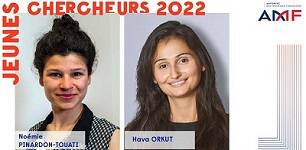The AMF awards its 2022 prize for young researchers in economics to HEC PhD Noémie Pinardon-Touati
This year, the Scientific Advisory Board of the Autorité des Marchés Financiers (AMF) awards its young researcher prize in economics to Noémie Pinardon-Touati (HEC PhD and Assistant Professor in the department of Economics at Columbia University), whose research focuses on financial intermediation and corporate finance, and Hava Orkut (PhD Strasbourg University, Associate Professor at EM Strasbourg Business School), for her work on behavioral finance.

Congratulations to Hava and Noémie! Read about AMF here.
Noémie also recently received the AQR Top Finance Graduate award as one of the most promising finance PhD graduates in 2022 and the European Finance Association (EFA) award, The Engelbert Dockner Memorial Prize, for the Best Paper by Young Researchers, her Job Market Paper.
Thesis Abstract: Three essays on government intervention and corporate behavior.
This three-chapter thesis investigates the interplay between government intervention and corporate financial and real behavior. The first chapter investigates how the financing of government expenditures affects corporate outcomes. I show that local governments’ increased reliance on debt to finance their expenditures adversely affects the private sector via a crowding out effect. In large developed and developing countries, local government debt mostly consists of bank loans. Using French administrative data over 2006-2018, I uncover a crowding out effect of these loans on corporate credit, investment, employment, and output. Combining causal reduced-form evidence and a model, I show that crowding out reduces the output multiplier of debt-financed local government spending by 0.3. These results show that constraints on financing supply reduce the stimulus effect of debt-financed government spending. The second chapter focuses on government intervention in the corporate sector. This chapter is in collaboration with Aymeric Bellon (Wharton) and Louis-Marie Harpedanne (Banque de France). We investigate the French credit mediation program, a policy aimed at helping firms solve their disputes with their lenders. In a mediation, an expert suggests a non-legally binding solution after communicating with all parties. Can a policy that only facilitates negotiation have any real effect? Exploiting administrative data and plausibly exogenous variation in eligibility to public mediators across counties for identification, we find that participating in a mediation reduces firms’ liquidation probability by 34.6 percentage points, and leads to higher credit, employment, and investment at the three-year horizon. All the effects are driven by firms that borrow from more than one bank. These results support the view that mediations solve coordination problems between lenders. In the last chapter, I study how the political economy distortions inherent to governments affect firms. This chapter is in collaboration with Anne-Laure Delatte (Université Paris Dauphine) and Adrien Matray (Princeton). We document a reciprocal favors scheme between local politicians and banks in France. We find that formally independent, profit-maximizing banks increase their supply of credit to the corporate sector for the constituencies of contested political incumbents in order to improve their reelection prospects. In return, politicians grant such banks access to the profitable market for loans to local public entities among their constituencies. These results show that, if politicians can control the allocation of rents, then formal independence does not ensure the private sector's effective independence from politically motivated distortions.
Read about studying your PhD in Finance at HEC Paris here.